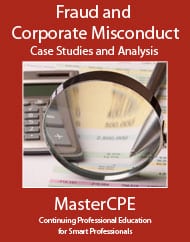Course Information
Fraud and Corporate Misconduct – Case Studies and Analysis
Course Information
| Title: | Fraud and Corporate Misconduct – Case Studies and Analysis |
|---|---|
| Category: | Accounting and Auditing |
| Field of Study: | Auditing |
| Course Code: | M213 |
| CPE Credits: | 6.0 |
| Price: | 49.95 |
Description
Description:
This course is designed to help professions better prepare for these questions by examining two infamous corporate scandals: 1) The Retail Empire: Crazy Eddie, and 2) The King of Cross-Sell: Wells Fargo. It details how Crazy Eddie applied various techniques to “cook the books” and deceive auditors. It explains how Wells Fargo employees engaged different types of sales practice misconduct to meet unrealistic sales targets. It also reviews the factors that led to the end of Crazy Eddie and Wells Fargo’s widespread customer abuses. Moreover, it discusses lessons learned from both cases that can result in improved audit processes. It identifies specific mistakes made by Crazy Eddie’s auditors and discussed what the auditors should have done. It also describes how internal auditors can help prevent the unethical practice from snowballing in Wells Fargo. Finally, it includes sample audit programs to provide insights into both financial and corporate culture audits.
Delivery Method: Online Interactive Self Study
Level: Overview
Prerequisites: None
Advanced Preparation: None
Course Details
Category: Accounting and Auditing
Field of Study: Auditing
Passing Score: 70%
Technical Details: Auditing is a technical field of study. CA: Fraud
For More Detail:
If you are unable to view PDF then right click the mouse and click save link as
Objectives
Objectives:
1. Recognize techniques used to manipulate earnings 2. Identify the red flags missed and audit mistakes made 3. Recognize the characteristics of financial statement fraud 4. Recognize the role of auditors in detecting financial statement fraud 5. Identify common fraudulent activities and misconduct 6. Identify the factors that led to Wells Fargo’s widespread customer abuses 7. Recognize how pressure, opportunity, and rationalization facilitate fraudulent activity 8. Cite the importance of and needs for corporate culture audits 9. Recognize the role of internal auditors in auditing corporate culture 10. Identify audit procedures and considerations for corporate culture
For More Objectives:
If you are unable to view PDF then right click the mouse and click save link as
Profession
NASBA: Yes
QAS: Yes
CPA: Suitable for all CPAs
IRS: No IRS credit for Enrolled Agents.
Profession Identifiers: CPA

